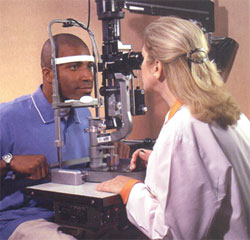Imagine being able to work, drive, and play sports without having to depend on glasses or contact lenses. Refractive surgery may make this a reality for you. You and your eye doctor can determine whether you're a good candidate for refractive surgery, and which procedure is right for you.
Today's refractive surgery 
Refractive surgery procedures are quick and often painless. They may be done in a doctor's office, surgery center, or hospital. You go home the same day. Lasers, small surgical devices, implants, or a combination of these may be used. But refractive surgery is not for everyone. This booklet tells you more about different refractive surgery procedures and their benefits, as well as their risks and limitations.
This booklet is not intended as a substitute for professional medical care.
Only your doctor can diagnose and treat a medical problem.
YOUR EYE CARE TEAM
You may work with the following eye specialists:
• An ophthalmologist, a physician who performs your surgery and oversees your eye care.
• An optometrist, an eye doctor who may be involved with your pre-and postoperative care.
• An ophthalmic technician, who may assist during refractive surgery.
EVALUATING YOUR VISION
To begin, you'll have a thorough eye exam. This exam may include:
• Tests of refraction (your corrective lens prescription).
• Measurement of your pupil (the eye' s opening).
• An exam of your cornea (the clear tissue that covers the eye).
• Mapping or scanning of your cornea to reveal its exact shape.
• Ultrasound (images made using sound waves) to measure corneal thickness.
• Dilation (enlargement) of your pupil to allow your eye doctor to examine the inside of your eye.
• Questions about your general health, eye health, and medical history.
